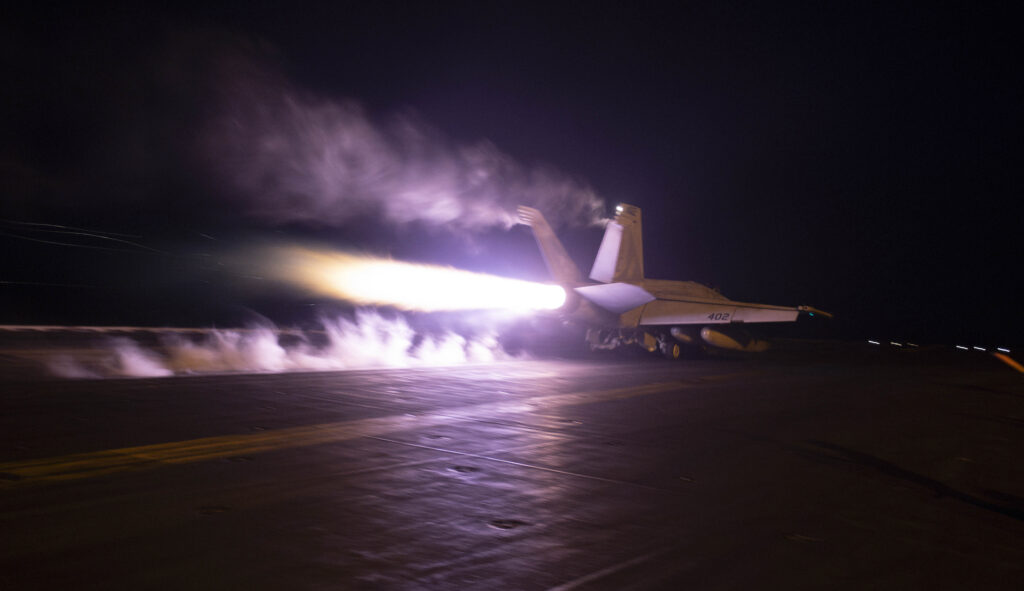Democratic and Republican senators alike expressed their skepticism of the way the Biden administration is handling the Houthi attacks against commercial vessels in the waterways off Yemen’s coasts.
The Houthis have carried out more than 45 attacks on commercial vessels transiting the Gulf of Aden, Bab al-Mandab Strait, and into the Red Sea dating back to mid-November. Roughly 15% of international maritime commerce passes through this nautical pathway through the Middle East, though many shipping companies have opted to reroute their shipments on longer, more expensive routes to avoid the Houthi threat.
The U.S. military has subsequently launched dozens of strikes against the Houthis, but the strikes have not led to a stoppage of attacks.
The U.S. special envoy for Yemen, Timothy Lenderking, and Daniel Shapiro, the deputy assistant secretary of defense for the Middle East, faced tough questions and statements on Tuesday during a Senate Foreign Relations subcommittee hearing.
“The Constitution requires Congress to authorize acts of war, period, stop, we swore an oath to follow the Constitution,” Sen. Chris Murphy (D-CT) said during the hearing. “If we believe this is a just military action, and I do, then we should authorize it. But we also need to acknowledge that there is a real risk of escalation in the Red Sea, especially since Iran is unquestionably aiding the actions of the Houthis. Thus, an authorization is important to legalize the existing operations but also guard against an unauthorized mission.”
“I’m having a hard time understanding why this does not require a traditional congressional war authorization,” he added.
Sen. Ben Cardin (D-MD), the chairman of the committee, agreed with Murphy, urging the administration to seek an Authorization for Use of Military Force for its continued back-and-forth with the Houthis.
The Biden administration, and Shapiro on Tuesday, has pointed to Article 2 of the Constitution, which confirms the commander in chief’s power to direct military action to defend U.S. military personnel, as providing him with the authority to direct attacks against them.

“This is hostilities, there’s no congressional authorization for them,” Sen. Tim Kaine (D-VA) said. “To claim that this is covered by Article 2 self-defense, Article 2 self-defense means you can defend U.S. personnel, you can defend U.S. military assets, you probably can defend U.S. commercial ships, but the defense of other nations’ commercial ships in no way and it’s not even close. That’s not self-defense under Article 2 of the Constitution, and a president can’t make it self-defense by calling another nation a partner. If you’re defending the commercial ships of other nations, it is in my view laughable to call that self-defense.”
Sen. Todd Young (R-IN) said he has “not seen such a strategy put forward” to deter continued Houthi aggression and meet “appropriate legal doctrine.” He added, “I do have doubts, however, that the administration has an actionable plan to bring an end to Houthi aggression, Iranian terrorism, and a curtailment of Russian and Chinese meddling in this vital region. Our military actions to date carried out by incredibly brave U.S. service members have yet to stop the Houthis.”
While the Houthis have claimed their attacks are in protest of Israel’s war in Gaza against Hamas, which has led to the deaths of tens of thousands of Palestinians, the Biden administration has argued it’s not actually what’s driving their attacks, in part because many of the ships the Houthis have targeted do not have connections to Israel or the U.S. for its support of Israel.
“I am a little disappointed that you so quickly try to pour cold water on the idea that this was connected to the war in Gaza,” Kaine said to Shapiro. “I think you will reestablish deterrence when we get a hostage deal that leads us to a truce, that leads us to humanitarian aid into Gaza, that leads us to the ability to discuss whether whatever that truce period is can be extended, and so I hope you don’t just pour cold water on the idea that, oh, this isn’t really related to Gaza.”
CLICK HERE TO READ MORE FROM THE WASHINGTON EXAMINER
Pentagon spokesman Patrick Ryder told reporters on Tuesday that U.S. forces have hit “more than 150 missiles and launchers, including anti-ship land attack and surface-to-air missiles, plus numerous communications capabilities, UAVs, unmanned surface vessels, coastal radars, air surveillance capabilities, rotary wing aircraft, underground facilities, to include weapons storage areas and command and control buildings.”
Shapiro said they had struck over 230 targets in Houthi-controlled Yemen.
